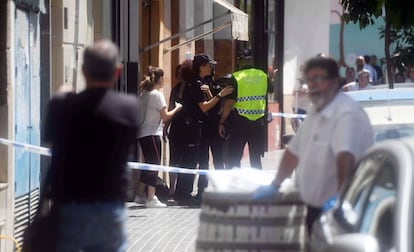Death of Brazilian mother of five marks 1,000th gender violence victim in Spain
Her alleged aggressor, Salvador Ramírez, was convicted for killing his first wife in the year 2002 and sent to jail, but released early after good behavior

Ana Lucía da Silva today officially became the thousandth woman to be killed in a domestic violence case in Spain. The central government delegation in the southern Spanish region of Andalusia confirmed on Wednesday that Da Silva, who died last Friday, has joined the long and tragic list of women who have been murdered by their partners or former partners since 2003, when official records began. Her body was found on June 14 next to that of her partner, Salvador Ramírez, by firefighters who entered their home in the Valdeolleros neighborhood in Córdoba after being alerted to a fire. When officers arrived minutes later, they found an “unusual” situation for a fire, according to police sources. From that moment on, the theory that Ramírez had killed his partner began to gain ground. On Wednesday, it was finally confirmed after the court in charge of the case announced it would be tried in a gender-violence court.
Da Silva’s family is hoping to raise €5,700 to repatriate her body to Brazil
Da Silva was allegedly killed by Ramírez, 45, who already had a murder conviction for killing another partner. In 2002, he confessed to murdering his then-wife, Amanda del Carmen Cabeza, in Algeciras (Cádiz), when he was 27 and she was 22. They were the parents of three small children and were separating. According to reports of the crime, the wife was regularly abused. Her body was found in the bathtub with signs of strangulation. He was sentenced to 17 years in prison and set to be released in 2020. But according to sources in the government subdelegation, he was granted Grade 3 prison status – the least restrictive – in October 2017, and conditional release in February 2018. In prison, he behaved so well he was awarded a number benefits. He even signed up to a program aimed at combating gender violence.
On December 21, 2017, the prison board recommended to a judge that Ramírez be given conditional release for a period of two years, adding a favorable report on his ability to reintegrate into society. On January 23, 2018, the Córdoba judge granted him conditional release and set out a series of rules, including the condition that he must live in a shelter run by the Catholic NGO Cáritas and “maintain until the end of the sentence the good behavior and conduct that have determined the individually established favorable prospect of social integration.”
Ramírez had signed up to a program against gender violence while in prison
Ana Lucía da Silva arrived in Córdoba from Brazil last spring, according to her sister, Priscila da Silva. She left four children behind but came to Spain with one daughter, Raquel, aged 16. Raquel was at school when her mother was allegedly murdered, and “a drama” reportedly unfolded when she was told. Soon after receiving the news, she went to the home with her aunt.
Da Silva had been in a relationship with Ramírez since the end of last year, and they lived together in the working-class neighborhood of Valdeolleros. Firefighters were called to the home after neighbors spotted smoke coming out of a window at around 11am on Friday. By the afternoon, smoke stains were still visible on the balcony, although the fire only affected one bedroom. The door remains sealed by police.
Da Silva had tried to start a new life in Córdoba. In an effort to adapt to her new country, she began attending Spanish classes at the beginning of this year. Ramírez went with her to her first class. “She was reserved, but always had a smile,” says one classmate. She went to classes twice a week and never missed a lesson. But she was forced to stop going two months later after finding work as a domestic helper. Although a local NGO had helped her to create a program to help her integrate into society and the workforce, Da Silva had found the job on her own.
She was a survivor, she fought to get ahead in complicated circumstances
Fellow church members
According to Da Silva’s fellow church members, “she sometimes worked in hotels, other times cleaning homes or caring for elderly people.” Every Sunday morning, Da Silva went to an evangelical church in the Santa Rosa neighborhood, popularly known as El Laurel. Ramírez went with her on several occasions.
“She introduced him. She wanted him to also follow her religion, but he didn’t speak a lot,” the same sources say, adding that Da Silva was a “very good and trusting” person. Perhaps for this reason, despite knowing about his murder conviction, she had no misgivings about him living with her and her daughter – something the people around her warned against. “She was a survivor, she fought to get ahead in complicated circumstances,” say the church members, who add the decision to share a flat with Ramírez was about sharing expenses, given that both were struggling financially.
Ramírez asked for permission to leave the Cáritas shelter and the public prosecution agreed. He had been working as a dishwasher in a restaurant for a year, thanks to a local NGO that helps people at risk of social exclusion. His workmates said Ramírez had “ideal” behavior, and found it strange that he didn’t turn up to his shift on Friday at 10am. They soon learned what had happened. In the neighborhood where they lived, not a lot was known about the couple. “We saw them sometimes, but not a lot,” say staff from the establishments next door to their flat.
Da Silva’s family is hoping to launch a GoFundMe campaign to raise €5,700 to repatriate her body to Brazil.
English version by Melissa Kitson.
Tu suscripción se está usando en otro dispositivo
¿Quieres añadir otro usuario a tu suscripción?
Si continúas leyendo en este dispositivo, no se podrá leer en el otro.
FlechaTu suscripción se está usando en otro dispositivo y solo puedes acceder a EL PAÍS desde un dispositivo a la vez.
Si quieres compartir tu cuenta, cambia tu suscripción a la modalidad Premium, así podrás añadir otro usuario. Cada uno accederá con su propia cuenta de email, lo que os permitirá personalizar vuestra experiencia en EL PAÍS.
¿Tienes una suscripción de empresa? Accede aquí para contratar más cuentas.
En el caso de no saber quién está usando tu cuenta, te recomendamos cambiar tu contraseña aquí.
Si decides continuar compartiendo tu cuenta, este mensaje se mostrará en tu dispositivo y en el de la otra persona que está usando tu cuenta de forma indefinida, afectando a tu experiencia de lectura. Puedes consultar aquí los términos y condiciones de la suscripción digital.









































